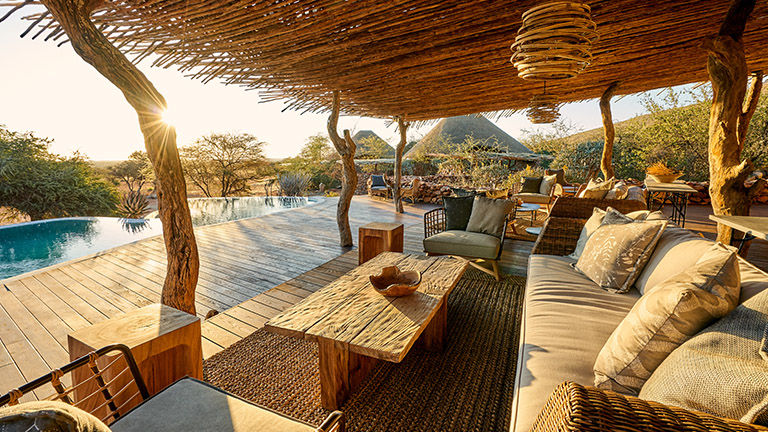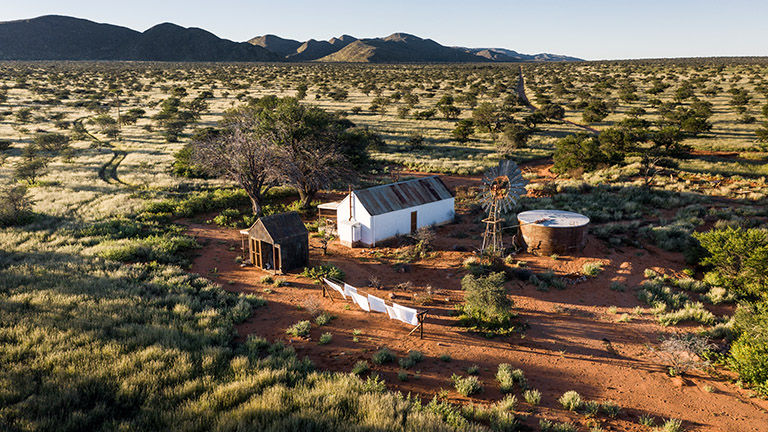The normally short drive from the private airstrip to check in at Tswalu Kalahari Reserve took roughly 45 minutes. First, we stopped to marvel at the giraffes that swiveled their heads toward the vehicle. Then, some wildebeests in the distance caught our attention. A few oryx thundered across the road, trailed by clouds of dust. Right before the lodge radioed to ask if everything was okay, we came across two cheetahs napping in the shade.
The nearly 300,000 acres of the southern Kalahari that make up Tswalu didn’t always look like this. Decades ago, it was an over-farmed, overhunted region with very little wildlife. Today, South Africa’s largest privately protected reserve is a rewilding success story, with 85 species of mammals — including pangolins, aardvarks and brown hyenas — several endangered species and native green vegetation in the desert. With a 40-guest maximum and three distinct luxury camps, a safari at Tswalu is designed to help visitors feel the remoteness of the landscape.
And this isn’t a cookie-cutter safari, either: Each booking is assigned its own private safari vehicle, along with a dedicated field guide and tracker for the duration of a stay, making game drives flexible and highly personalized. In three days, I came across another set of guests just once, at a pride of rare Kalahari black-maned lions. (And who could blame them for lingering?)
In addition to game drives, guests can enjoy nature walks, go bird watching, take a guided walking tour with the safari guide, visit ancient rock carvings, ride horses from the stables into the Korannaberg Mountains and visit scientists conducting environmental research in the wild or at the community clinic and preschool.
Safari Camps
Each of the three safari camps is designed with natural elements that offer an unmistakable level of sophistication without sacrificing comfort.
Groups will love Tarkuni Homestead, a stylish five-bedroom private home in the valley with space for up to 10 guests. The indoor-outdoor design features a neutral color palette and plenty of natural light, creating a spacious and relaxing atmosphere. The bedrooms feel more like private suites thanks to indoor and outdoor showers and private patios. Tarkuni offers a fully customizable safari experience, complete with a personal staff and private chef. Meals are flexible (and can be eaten as a group indoors or out), and guests can take advantage of a refrigerator full of drinks throughout the day when not on a game drive. A cozy fire pit looks out onto a nearby watering hole that’s frequented by thirsty buffalo and oryx — and, at dusk, the occasional leopard.
 The verandah at Motse, the original camp at Tswalu
The verandah at Motse, the original camp at Tswalu
Credit: 2023 Tswalu Kalahari ReserveFrom their rooms at the Motse Camp, guests can take in uninterrupted views of the Korannaberg Mountains and beautiful on-site gardens with indigenous Kalahari plants. Motse has nine contemporary suites (known as “legae” in Tswana) that can accommodate up to 18 adults. Each legae is designed from natural materials and has its own wood-burning stove, indoor and outdoor shower, private patio, personalized minibar, living area and separate dressing area. Parents traveling with kids will love the three family legae with two en-suite bedrooms.
The recently debuted Loapi Tented Camp, surrounded by open savannah grasslands, offers four tented homes with one bedroom and two with two bedrooms. Designed for clients seeking extreme privacy, each home operates as a “mini-camp”: The homes are set at least 165 feet apart from each other, and there are no communal or shared guest areas or services. Each Loapi accommodation comes with a full bar (complete with a collection of South African wines), a private study, a personal butler, a private chef, indoor and outdoor showers, a plunge pool and a fire pit.
Klein Jan and More Dining
Dining at Tswalu is a creative endeavor designed around upscale sustainability. Guests can experience boma (barbecue) dinners, dune picnics, private dining and, most notably, Klein Jan.
Klein Jan is the brainchild of chef Jan Hendrik van der Westhuizen, South Africa’s first Michelin-starred chef (and the owner of Restaurant Jan in Nice, France, which won him the honor). Since the celebrated chef is a Northern Cape local, Klein Jan incorporates ethically sourced and foraged regional produce that highlights the history and cuisine of the Kalahari.
 Klein Jan restaurant serves five-star meals in a renovated century-old homestead.
Klein Jan restaurant serves five-star meals in a renovated century-old homestead.
Credit: 2023 Tswalu Kalahari ReserveThe high-end, multicourse dining experience takes guests on an actual journey — starting with cocktails on the porch of a renovated century-old homestead, through a chic root cellar used as cold storage and, finally, to the dining room, which is open on one side to keep the focus on nature. Each artfully presented course comes with a hyper-local or greater South African wine-pairing option and a brief food lesson.
Guests at Tswalu are guaranteed one (inclusive) reservation at Klein Jan during their stay. The restaurant has a months-long waiting list for non-guests, who often fly into and out of the private airstrip for this critically acclaimed dinner.
Research and Conservation
The Kalahari is a critical ecosystem that can be difficult to study. The Tswalu Foundation supports the important ecological research done at the reserve, including allowing researchers to study the region’s unique wildlife and environmental cycles up close.
Researchers are actively studying local pangolins (an endangered creature that remains mysterious to scientists) and working to conserve the desert black rhino. Among its other creatures, this area of the Kalahari is home to black-maned lions, brown hyenas, aardvarks and meerkats, all of which are responding to environmental challenges in ways that may be significant for every Kalahari-dwelling species.
Know Before You Go:
Guests can arrive at Tswalu’s private airstrip via the international airports at either Cape Town (two hours) or Johannesburg (1.5 hours). Driving or helicopter transfers are also available. Tswalu is malaria-free.